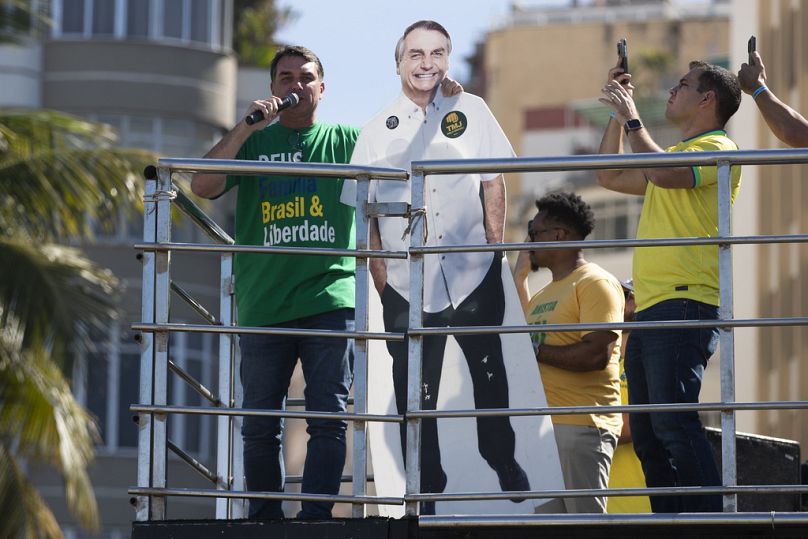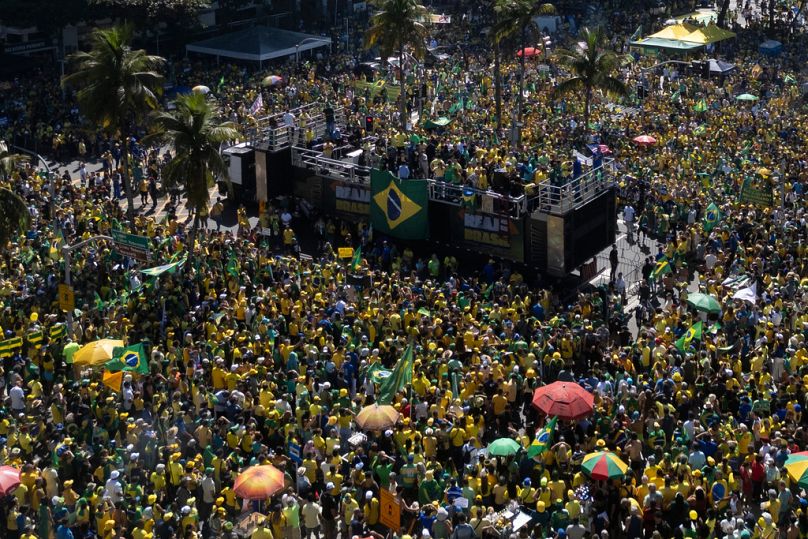Brazil’s Supreme Court issued a house arrest order on Monday for former President Jair Bolsonaro, who is on trial for allegedly masterminding a coup plot following his defeat to incumbent President Luiz Inácio Lula da Silva in the 2022 general elections.
Judge Alexandre de Moraes, who has been leading investigations into Bolsonaro’s alleged misconduct before the top court said the 70-year-old former president had violated precautionary measures imposed on him by spreading content through his three lawmaker sons.
Bolsonaro’s legal team said in a statement that they will appeal the decision. His attorneys stressed that his words “good afternoon, Copacabana, good afternoon my Brazil, a hug to everyone, this is for our freedom”, broadcast from the cell phone of one of his children during a protest in Rio de Janeiro “cannot be regarded as ignoring precautionary measures or as a criminal act.”
“The flagrant disrespect to the precautionary measures was so obvious that the defendant's son, Senator Flávio Bolsonaro, decided to remove the posting in his Instagram profile, with the objective of hiding the legal transgression,” wrote de Moraes.

De Moraes also said that Bolsonaro “addressed protesters gathered in Copacabana, in Rio” on Sunday so his supporters could “try to coerce the Supreme Court.”
Flávio Bolsonaro claimed on X that Brazil “is officially in a dictatorship” after his father’s house arrest. “The persecution of de Moraes against Bolsonaro has no limits," the senator wrote.
Bolsonaro’s trial has been in the spotlight following the re-election of US President Donald Trump, who has been a vocal supporter of Bolsonaro during his legal proceedings. Trump has often clashed with President Lula da Silva over the proceedings, calling them illegal and demanding his acquittal on several occasions.
The 47th US president has even tied his latest tariffs of 50% on Brazilian exports to the United States directly to his ally’s judicial situation. He has called the case against Bolsonaro a “witch hunt”, triggering nationalist reactions from Brazilian lawmakers from across the political spectrum.
In a statement just hours after the ruling was announced, the US State Department’s Bureau of Western Hemisphere Affairs condemned Justice de Moraes’ order on X and vowed to “hold accountable all those aiding and abetting sanctioned conduct.”
“Putting even more restrictions on Jair Bolsonaro’s ability to defend himself in public is not a public service. Let Bolsonaro speak,” the office said.
The post comes just days after the State Department announced sanctions against de Moraes over “serious human rights abuse”, misuse of power and the unfair and politically motivated targeting of Bolsonaro.
Brazil’s government is yet to comment on the case.
What is Bolsonaro accused of?
Brazilian prosecutors accuse Jair Bolsonaro of leading a criminal organisation that plotted to overturn the elections, including plans to kill Lula and de Moraes, after the populist leader narrowly lost his re-election bid in 2022.
Monday’s order comes a month after Bolsonaro was ordered to wear an ankle monitor to track his movement and imposed a curfew on his activities while legal proceedings are under way.
Only family members and lawyers are allowed to visit Bolsonaro following this ruling and all mobile phones were confiscated from his home.

The latest ruling from the Brazilian justice comes a day after tens of thousands of Bolsonaro supporters took the streets in the cities of Sao Paulo and Rio de Janeiro, pleading for Brazil’s congress to pardon him and hundreds others who are either under trial or jailed for their roles in the destruction of government buildings in the capital Brasilia on 8 January 2023.
Bolsonaro is expected to remain in Brasilia for his house arrest, as he is not allowed to travel. He also has a house in Rio de Janeiro, where he held his electoral base as a lawmaker for three decades.
The former army captain is the fourth former president of Brazil to be arrested since the end of the country's military rule from 1964 to 1985, which Bolsonaro is a supporter of.
Lula was imprisoned for almost 600 days between 2018 and 2019 in a corruption conviction that was later tossed out by the Supreme Court, citing the bias of the judge in the case.







